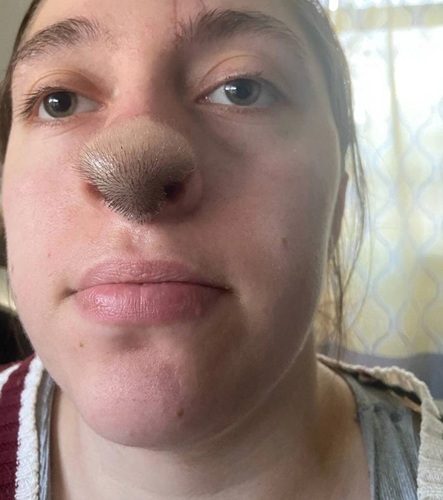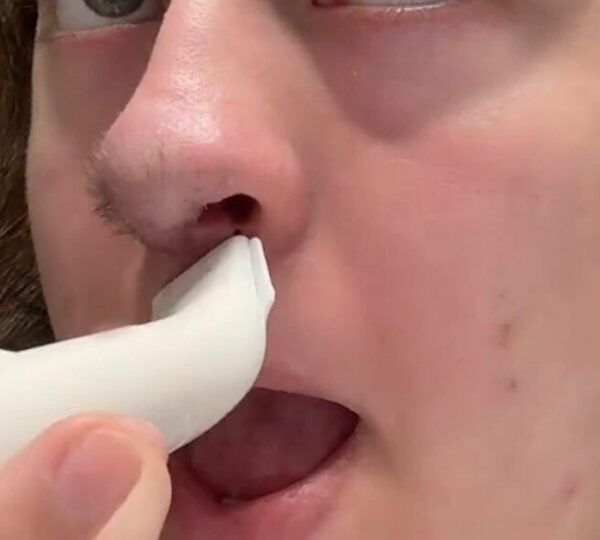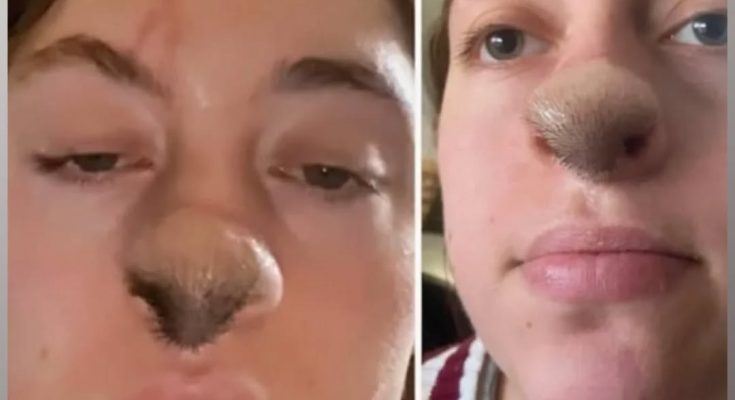
From Bite to Bizarre: Woman Grows Nose Hair Following Dog Attack!
Life has a way of shifting in the most unexpected moments. For Trinity Rowles, that shift came in September 2022, on what began as a completely normal afternoon at home. In a matter of seconds, everything she knew about safety, comfort, and even her own identity was turned upside down. Trinity was at home with her father and his rescue dog, Irish — a Pitbull-Bulldog mix. Irish had always been described as gentle, affectionate, and loyal. He had never displayed any signs of aggression before. Like many rescue animals, he was seen as a success story — a loving companion who had been given a second chance at life. But that perception changed in an instant.
Following a heated argument between Trinity and her father, something in the atmosphere shifted. No one can say for sure what triggered the dog, but in that moment, Irish attacked without warning. The violent outburst was sudden and devastating. Trinity was left with severe injuries to her face, ears, and one of her arms. She recalls fragments of the attack — pain, fear, the struggle to protect herself, and the sheer power of the animal that was once considered safe.
When emergency responders arrived, Trinity was barely conscious. She was rushed to the hospital, where doctors began immediate efforts to save her life. Her facial injuries were so extensive that she required emergency reconstructive surgery. Over the following weeks, she underwent multiple medical procedures, including skin grafts taken from her scalp and forehead to repair the tissue damage on her nose and face. The physical pain was immense. She remained in recovery for weeks, surrounded by doctors, nurses, and loved ones who provided care and support. But as she soon learned, the emotional and psychological wounds would be even harder to treat.
Shortly after the attack, Trinity was diagnosed with Post-Traumatic Stress Disorder (PTSD). Each night brought nightmares. Flashbacks occurred without warning. Simple sounds — a dog barking, a door slamming — could trigger panic. Activities that used to feel normal, such as going for a walk or visiting a friend, now felt terrifying. Her anxiety became a constant companion, and sleep was often out of reach.
Despite the emotional toll, Trinity didn’t give up. She began trauma-focused therapy and sought professional help to manage her PTSD. Through counseling, she learned grounding techniques and coping strategies to gradually rebuild her sense of safety. The road to recovery was anything but linear. Some days felt like progress; others, like starting all over again. Still, she remained determined. Then came an unexpected and deeply personal complication — one that would again test her strength and self-image.

During one of the skin graft procedures, doctors had taken tissue from her scalp to help reconstruct her nose. The graft was medically necessary and done with care. However, several weeks into her recovery, Trinity noticed something unusual: hair had begun growing on her nose. The hair growth was a natural result of using scalp tissue — a possibility that doctors had mentioned, but one Trinity hadn’t fully anticipated. Seeing it in the mirror, though, was shocking. After everything she had endured — the trauma, the surgeries, the emotional pain — this new and visible reminder felt like a cruel twist of fate.
At first, Trinity was devastated. Every reflection reminded her of the attack, the surgeries, and how much her appearance had changed. It affected her self-esteem deeply. But instead of retreating from the world, she chose to face this new reality with honesty and resilience. Trinity turned to social media, especially TikTok, to share her story with the world. Not to seek pity — but to open a conversation about trauma, healing, and self-acceptance. She documented her surgical journey, her mental health struggles, her frustrations, and even the moments she found joy or humor in small victories.
Her content quickly gained attention. Thousands of people connected with her transparency, strength, and vulnerability. She spoke openly about how difficult it was to deal with changes in her appearance, but also about how important it was to find confidence in who you are — not in how perfect you look. Through her posts, she created a space for other survivors of trauma — people who had been through accidents, attacks, or medical complications — to feel seen and supported. Many reached out to her, sharing their own stories and thanking her for her courage. In opening up about her experience, Trinity helped countless others feel less alone.
But not all reactions were kind. With visibility came cruel comments, judgment, and mockery from people who didn’t understand her story or the complexities of trauma recovery. Some made fun of the hair growth. Others doubted her story altogether. Yet Trinity remained composed. She reminded her followers — and herself — that real beauty lies in resilience, not perfection.
She continued to educate, uplift, and empower. One of the most powerful moments she shared was about the first time she looked in the mirror after her surgeries. In the beginning, all she could see were scars and reminders of pain. But over time, she began to see something more — a woman who had survived. Someone who had endured something horrific and chosen to keep living with purpose and dignity.

To this day, Trinity has undergone four major surgeries, with more still to come. These future procedures aim to improve her healing and address the hair growth issue. Unfortunately, they are expensive. Like many trauma survivors, Trinity has had to turn to crowdfunding and donations to afford the continuing medical costs. It’s yet another challenge in an already overwhelming journey — but she faces it with the same strength she brings to everything else.
Despite everything, Trinity’s message remains clear and powerful:
“You can still find light in the darkest places. Healing is possible, even when it feels impossible.”
Her journey is a reminder that trauma doesn’t have to define a person — it can transform them. She has taken the pain that once threatened to break her and used it to build something stronger: a platform, a message, and a community that values compassion, honesty, and inner strength.
Today, Trinity Rowles is more than a survivor. She is a voice for those who haven’t yet found theirs. She is an example of what it means to reclaim your life, your identity, and your worth — even after unthinkable hardship. Through her openness and advocacy, she continues to inspire thousands of people across the world to believe that healing is not only possible — it’s powerful.
Life has a way of shifting in the most unexpected moments. For Trinity Rowles, that shift came in September 2022, on what began as a completely normal afternoon at home. In a matter of seconds, everything she knew about safety, comfort, and even her own identity was turned upside down. Trinity was at home with her father and his rescue dog, Irish — a Pitbull-Bulldog mix. Irish had always been described as gentle, affectionate, and loyal. He had never displayed any signs of aggression before. Like many rescue animals, he was seen as a success story — a loving companion who had been given a second chance at life. But that perception changed in an instant.
Following a heated argument between Trinity and her father, something in the atmosphere shifted. No one can say for sure what triggered the dog, but in that moment, Irish attacked without warning. The violent outburst was sudden and devastating. Trinity was left with severe injuries to her face, ears, and one of her arms. She recalls fragments of the attack — pain, fear, the struggle to protect herself, and the sheer power of the animal that was once considered safe.
When emergency responders arrived, Trinity was barely conscious. She was rushed to the hospital, where doctors began immediate efforts to save her life. Her facial injuries were so extensive that she required emergency reconstructive surgery. Over the following weeks, she underwent multiple medical procedures, including skin grafts taken from her scalp and forehead to repair the tissue damage on her nose and face. The physical pain was immense. She remained in recovery for weeks, surrounded by doctors, nurses, and loved ones who provided care and support. But as she soon learned, the emotional and psychological wounds would be even harder to treat.
Shortly after the attack, Trinity was diagnosed with Post-Traumatic Stress Disorder (PTSD). Each night brought nightmares. Flashbacks occurred without warning. Simple sounds — a dog barking, a door slamming — could trigger panic. Activities that used to feel normal, such as going for a walk or visiting a friend, now felt terrifying. Her anxiety became a constant companion, and sleep was often out of reach.
Despite the emotional toll, Trinity didn’t give up. She began trauma-focused therapy and sought professional help to manage her PTSD. Through counseling, she learned grounding techniques and coping strategies to gradually rebuild her sense of safety. The road to recovery was anything but linear. Some days felt like progress; others, like starting all over again. Still, she remained determined. Then came an unexpected and deeply personal complication — one that would again test her strength and self-image.

During one of the skin graft procedures, doctors had taken tissue from her scalp to help reconstruct her nose. The graft was medically necessary and done with care. However, several weeks into her recovery, Trinity noticed something unusual: hair had begun growing on her nose. The hair growth was a natural result of using scalp tissue — a possibility that doctors had mentioned, but one Trinity hadn’t fully anticipated. Seeing it in the mirror, though, was shocking. After everything she had endured — the trauma, the surgeries, the emotional pain — this new and visible reminder felt like a cruel twist of fate.
At first, Trinity was devastated. Every reflection reminded her of the attack, the surgeries, and how much her appearance had changed. It affected her self-esteem deeply. But instead of retreating from the world, she chose to face this new reality with honesty and resilience. Trinity turned to social media, especially TikTok, to share her story with the world. Not to seek pity — but to open a conversation about trauma, healing, and self-acceptance. She documented her surgical journey, her mental health struggles, her frustrations, and even the moments she found joy or humor in small victories.
Her content quickly gained attention. Thousands of people connected with her transparency, strength, and vulnerability. She spoke openly about how difficult it was to deal with changes in her appearance, but also about how important it was to find confidence in who you are — not in how perfect you look. Through her posts, she created a space for other survivors of trauma — people who had been through accidents, attacks, or medical complications — to feel seen and supported. Many reached out to her, sharing their own stories and thanking her for her courage. In opening up about her experience, Trinity helped countless others feel less alone.
But not all reactions were kind. With visibility came cruel comments, judgment, and mockery from people who didn’t understand her story or the complexities of trauma recovery. Some made fun of the hair growth. Others doubted her story altogether. Yet Trinity remained composed. She reminded her followers — and herself — that real beauty lies in resilience, not perfection.
She continued to educate, uplift, and empower. One of the most powerful moments she shared was about the first time she looked in the mirror after her surgeries. In the beginning, all she could see were scars and reminders of pain. But over time, she began to see something more — a woman who had survived. Someone who had endured something horrific and chosen to keep living with purpose and dignity.

To this day, Trinity has undergone four major surgeries, with more still to come. These future procedures aim to improve her healing and address the hair growth issue. Unfortunately, they are expensive. Like many trauma survivors, Trinity has had to turn to crowdfunding and donations to afford the continuing medical costs. It’s yet another challenge in an already overwhelming journey — but she faces it with the same strength she brings to everything else.
Despite everything, Trinity’s message remains clear and powerful:
“You can still find light in the darkest places. Healing is possible, even when it feels impossible.”
Her journey is a reminder that trauma doesn’t have to define a person — it can transform them. She has taken the pain that once threatened to break her and used it to build something stronger: a platform, a message, and a community that values compassion, honesty, and inner strength.
Today, Trinity Rowles is more than a survivor. She is a voice for those who haven’t yet found theirs. She is an example of what it means to reclaim your life, your identity, and your worth — even after unthinkable hardship. Through her openness and advocacy, she continues to inspire thousands of people across the world to believe that healing is not only possible — it’s powerful.



